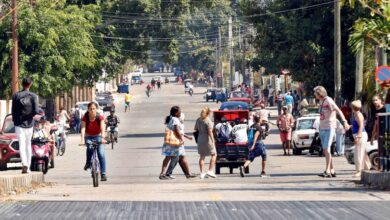ABC to understand JEP’s situation
Listen this article
On March 10, Colombian President Ivan Duque objected to the Statutory Law of the JEP, what will happen now?

Through a presidential address, Iván Duque objected to six articles of the Statutory Law, which is a law that, although it has not been implemented, is crucial to sanction situations related to the armed conflict. However, what caused most stir, was the fact that the decision also is to present a constitutional reform of the legislative act that gave legal basis to the peace agreement before Congress.
Leer en español: El ABC del problema de la JEP
From that moment, the political debate was revived, then, although there is a sector that supports the decision of the president (mainly the party to which it belongs, Centro Democrático), the majority of opponents joined, and even achieved massive assistance in the march of the "18M", in which they expressed their support for the JEP, and asked Congress not to process the objections of Duque, according to El Espectador. In LatinAmerican Post we tell you more about what is happening in Colombia in this matter.
The Jurisdicción Especial para la Paz (JEP)
This jurisdiction was created in 2015 by the National Government, to exercise judicial functions that will only be valid within the framework of the end of the armed conflict. As explained by the FM, "it will fulfill the duty of the Colombian State to investigate, clarify, prosecute, prosecute and punish the serious violations of human rights and the serious breaches of International Humanitarian Law (IHL) that took place in the context and in the reason for the armed conflict. "
Thus, according to BBC, the courts through this jurisdiction will be those involved in crimes related to the war starring for more than 50 years, who will have minor penalties on the condition that they acknowledge their guilt "and comply with other conditions such as delivery of goods and of information". In the same way, within this point is the benefit of not being extradited. All of the above, due to the fact that in the negotiations it was sought that the punishments, beyond punitive ones, were going to be restorative for the victims.
Also, the JEP forward several important processes, within which the investigations are by 'falsos positivos' or cases of systematic abductions.
"Todo mi respeto a la #JEP como institución. Ojalá logremos, a través de ellos, salir adelante y que el país pueda tener un futuro muy distinto al de seguir naufragando en la guerra", dice el periodista @DanielSamperO.#ConfíoEnLaJEP pic.twitter.com/J0aYpmyuWO
— Jurisdicción Especial para la Paz (@JEP_Colombia) 20 de marzo de 2019
The controversial Statutory Law
This law was created to regulate the transitional justice process. Thanks to this, the judges of the JEP will be able to make decisions autonomously. According to Colombia 2020, the objective of this law is "to guarantee the right to truth, justice, reparation, and non-repetition, which includes the participation of the victims and the armed actors of the conflict, who decided to submit to this justice".
Now, it is important to emphasize that this law is not above the Constitution, but on any ordinary law. In addition, in order to be approved, the Constitutional Court lasted six months regulating it, to ensure that it did not violate the Constitution.
Maybe you are interested in reading: Iván Duque and the polemic decisions against JEP
What does the president object to?
Duque objected to six of the 159 articles within this law, under the appeal of convenience, where it is considered that within the law there are things that can be changed or deleted because "they may conflict or not be convenient with other functions of the State ", According to El Espectador.
Thus, the six points that Duque refers to are aimed at repairing victims; that the one who participates in a peace process be decided by the High Commissioner for Peace; define when the investigations of the ordinary justice related to the JEP, can be suspended, "allow the waiver of criminal action against crimes against humanity, genocide or war crimes in relation to those who are not responsible", according to Semana; maintain extradition and, finally, prevent the entry of evidence to the JEP, when they do not have in fact.
#EnVivo | Alocución del Presidente de la República @IvanDuque. https://t.co/aKUkGwX3hw
— Presidencia Colombia (@infopresidencia) 11 de marzo de 2019
Read also: Illegal mining and criminal groups: another problem in Venezuela
Goodbye to peace?
With the decision of Duque, several experts said that it was a direct blow to the peace process that is taking place. According to Colombia 2020, "for the international community, this gesture can be interpreted as another blow to this justice to prevent it from functioning".
On the other hand, Sergio Jaramillo, former peace commissioner, affirms that Duque "took off his mask and surrendered himself to the extremists of his party". Centro Democrático, led by Álvaro Uribe, has been a key factor in the decisions of this jurisdiction because they are the main opponents of the peace process.
Now, according to La W, the Full Chamber of the Constitutional Court would respond to President Duque, "that these objections are not for inconvenience but unconstitutional". What does this mean? When a law is objected it can be in two ways, one of convenience (as explained above, elements that can be changed because they are not convenient with the functions of the State) or the other by constitutionality (approved by the Constitutional Court).
"In this way, for the high court, they would only be inconvenient for three reasons: political, social and fiscal. That is to say, none of those presented by President Duque", according to the same media.
Political shake
Before the decisions of Duque, the political opposition of the country was united and for the first time, a reply was made to the speech of the president. Spearheaded by the representative of the House belonging to the party Alianza Verde, Juanita Goebertus, "said that the decision to object sections of the Law of the Special Jurisdiction of Peace puts the separation of powers at serious risk, undermines the construction of peace and seeks to distract to the citizenship of a national political agenda", according to Semana. In this way, Goebertus "showed her replies to each of the six points objected by Duque", according to El Universal.
LatinAmerican Post | Laura Viviana Guevara Muñoz
Translated from "El ABC del problema de la JEP"





